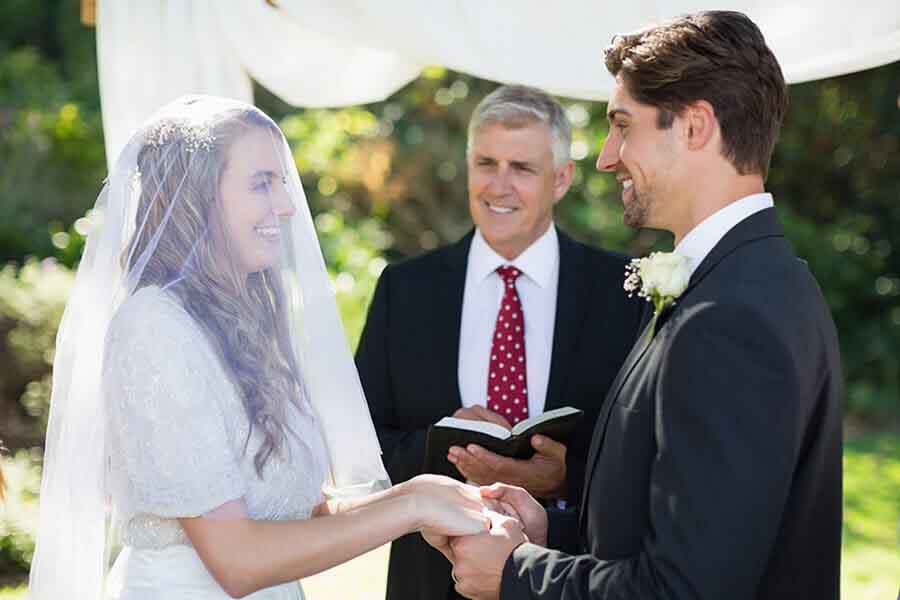
Updated 6-17-24.
Currently, only Florida, Montana, Maine*, Nevada, South Carolina and Tennessee authorize Notaries to perform weddings. However, Notaries in other states have found other ways to add “wedding officiant” to their growing list of client services.
Becoming an ordained minister or wedding officiant
Virginia Notary and small business owner John Cole became an ordained minister online. “Internet ordination is totally legal and recognized in most jurisdictions,” says Cole. He then registered as an ordained minister in the jurisdictions in which he wanted to perform the rites of marriage, automatically placing himself on an official list of ministers.
“You can then market your services in much the same way as you market your Notary services,” said Cole, who uses a professional website to advertise all of his services. “I specialize in last-minute weddings with a price point of $150, all-inclusive. I’ve performed about 150 weddings so far.”
Notaries who become ordained ministers can market their services through social media platforms, a professional website, business cards and brochures placed in strategic locations such as bridal conventions and boutiques, and even car decals, t-shirts or other “leave-behinds” such as magnets, pens, or desk calendars. You can also use your Notary business as a way to advertise. Cole’s first-ever job as a wedding officiant came by way of a conversation during a routine notarization when the signers inquired about Cole’s wedding services.
“Two weeks later I performed my first marriage ceremony,” says Cole. “It was a very nice home ceremony and an event that I will never forget. If you treat a family well at a signing, you open up the possibility of being the person that notarizes their life documents, their children’s documents, and, in this case, joins the couple in marriage.”
Like Cole, California Notary Valerie Barrett discovered being a Notary allows her to offer additional client services. Barrett’s inspiration to become ordained came when a friend’s daughter got married. “The officiant totally dropped the ball,” says Barrett. “And I thought, why can’t I do it?” An ordained friend helped mentor her through the process, using an online organization that required coursework, mentorship, and completion of an online exam. Upon completion, Barrett received a license allowing her to perform wedding ceremonies in all 50 states.
“I sit down with my couples to ask questions, such as how they met and what is most important to them,” says Barrett, who then uses this information to write the couple’s vows and to personalize the ceremony. She then inquires whether they need a certified copy of their wedding license (which California requires if the couple wishes to receive a confidential marriage license), if they’ll be doing a legal name change, or if they’ll require any other documents or notarizations — all of which she can provide.
In California, a limited number of specially authorized Notaries in each county are authorized to issue confidential marriage certificates for weddings. Issuing a confidential marriage certificate is not the same as officiating at a wedding. California does not authorize its Notaries to perform marriage ceremonies as part of their commissioned duties.
“These are the last things most couples are thinking about,” says Barrett. Combining her Notary and officiant services allows her to offer clients a customized approach.
“I complete all the paperwork, get their signatures and pop it all in the mail,” says Barrett. “It’s my job to make sure it is done correctly. They trust me to do the job right.”
Check your state’s laws regarding wedding officiants
Notaries interested in becoming wedding officiants should begin by checking state wedding laws. For example, licensing requirements vary greatly from state to state. Contact the county clerk in the counties in which you want to perform weddings for more information. A simple Google search on “How to become ordained” yields numerous links and organizations, but be sure to vet each carefully to find out if they are reputable, what the fees and requirements are, and where, exactly, the ordination is recognized. Some ministries will ordain you for life; others require annual license renewals.
Though many of the online ordination sites are non-denominational, those actively involved in a church might also want to consult their clergy before pursuing ordination to see if it might affect your standing in the church.
*Effective July 1, 2023, Maine Notaries automatically receive a license as a marriage officiant. However, Maine Notaries may opt out if they choose.
Additional Resources:
Alternate income opportunities for Notaries